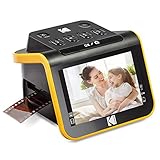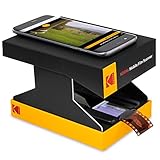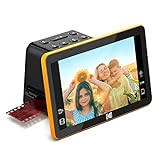In 2025, capturing and preserving your cherished memories has never been easier with the latest portable film scanners. These devices combine speed, high resolution, and user-friendly designs, making it simple for you to digitize photos, slides, and negatives. Whether you’re a casual user or a photography enthusiast, you’ll find a scanner that meets your needs. But with so many options available, how do you choose the right one for your collection?
KODAK Slide N SCAN Film & Slide Scanner Digitizer
If you’re looking to preserve your cherished memories from film and slides without the hassle, the KODAK Slide N SCAN Film & Slide Scanner Digitizer is an excellent choice. This compact device measures just 5.27 x 5.35 x 3.74 inches and weighs only a pound, making it easily portable. It supports various film types and delivers stunning 22MP JPEG photos. With a user-friendly interface and quick-scanning capability, you can convert images in about 2 seconds. Simply connect it to a USB-C computer for easy image transfer. For the best results, consider using photo editing software to enhance your scanned images.
Best For: Anyone looking to easily digitize and preserve their film and slide memories with a compact and user-friendly scanner.
Pros:
- Easy to use with a quick-scanning capability of approximately 2 seconds per image.
- Supports various film types (135, 126, and 110) and 50mm slides, making it versatile for different users.
- Produces high-quality 22MP JPEG photos suitable for printing up to 8×10 inches.
Cons:
- Requires a compatible SD card for storage, which is not included with the device.
- Lacks wireless connectivity, limiting direct transfer to smartphones.
- Image quality may vary depending on the condition of the original negatives and slides.
ClearClick Digital Photo, Slide, and Film Scanner
The ClearClick Digital Photo, Slide, and Film Scanner is perfect for anyone looking to quickly digitize cherished memories without the need for a computer. You’ll appreciate its fast scanning capability at 10 MegaPixels, taking just 2-3 seconds per scan. This portable device is compatible with various photo sizes and includes a 4 GB memory card, storing over 1,000 images. Setting it up is a breeze, and you can preview scans on the 2.4-inch color screen. While some users report issues with alignment and scan quality, its ease of use and included editing software make it a great choice for digitizing your memories.
Best For: Those looking for an easy and portable solution to digitize their photos, slides, and negatives without needing a computer.
Pros:
- Fast scanning capability at 10 MegaPixels, taking only 2-3 seconds per scan.
- User-friendly setup with a preview screen, making it accessible for average users.
- Includes editing software for retouching, cropping, and creating collages.
Cons:
- Poor photo holder design may cause misalignment and difficulty removing photos.
- Inconsistent scan quality, particularly with glossy photos, leading to potential glare issues.
- Challenges with securing negatives and slides properly in the holders.
KODAK Mobile Film Scanner for 35mm Films & Slides
For anyone looking to easily digitize their cherished memories, the KODAK Mobile Film Scanner for 35mm Films & Slides stands out as a top choice in 2025. This user-friendly device lets you scan and view your old films and slides using your smartphone camera. Its collapsible design makes it portable, perfect for family outings. With a battery-powered LED backlight and a free Android app, you can effortlessly scan, edit, and share images. Just load the film, position your phone, and capture. It’s an engaging way to rediscover your memories without the hassle of complicated equipment or expensive services.
Best For: Anyone looking for an easy and affordable way to digitize and share their old 35mm films and slides using a smartphone.
Pros:
- Portable and lightweight design makes it easy to take on family outings.
- User-friendly operation with a free Android app for scanning and editing.
- Eco-friendly construction and no need for complicated equipment or services.
Cons:
- Image resolution may vary depending on slide and smartphone camera quality.
- Primarily designed as a playful tool, which may limit professional use.
- Cardboard construction may not be as durable as other materials.
KLIM K2 Mobile Film Scanner (35mm)
Looking for a convenient way to digitize your 35mm films and slides? The KLIM K2 Mobile Film Scanner is the perfect choice for you. It’s portable, easy to use, and folds for storage. You can digitize black & white, color positives, negatives, and slides in minutes using the free KLIM app. Just unfold the scanner, turn on the LED, insert your film, place your phone, and you’re good to go! While the scans yield low-resolution images, it’s suitable for casual viewing. Plus, with a 5-year warranty and 30-day return policy, you can try it risk-free!
Best For: Casual users looking for an affordable and convenient way to digitize 35mm films and slides without the need for professional-grade quality.
Pros:
- Easy to use with a simple setup process through the free KLIM app.
- Portable design that folds for convenient storage and travel.
- Comes with a 5-year warranty and 30-day return policy for a risk-free purchase.
Cons:
- Scans typically yield low-resolution images (2-3 MP), which may not be suitable for high-quality prints.
- Some users report issues with color accuracy and detail loss during scanning.
- Compatibility issues with certain smartphone models can affect scanning results.
Kodak Slide N Scan Max Digital Film Slide Scanner, Black/Yellow (RODFS70)
With its user-friendly interface and quick-feeding tray technology, the Kodak Slide N Scan Max Digital Film Slide Scanner (RODFS70) is perfect for casual users who want to digitize their cherished slides and negatives. This compact scanner handles various film types, including 50mm slides and 135, 110, and 126 negatives. It features a 7” LCD for easy photo previewing and editing. Scanning is efficient, with an average roll taking less than 10 minutes. You’ll save considerably compared to commercial options, making it a smart choice for those with large collections. Just clean your slides, and you’re ready to capture those memories!
Best For: Casual users looking to digitize their collection of slides and negatives efficiently and economically.
Pros:
- Easy-to-use interface with quick-feeding tray technology for fast scanning.
- Supports various film types, making it versatile for different users.
- Cost-effective solution compared to professional scanning services.
Cons:
- May not meet the quality expectations of professional photographers.
- Requires adjustments for exposure and may need multiple scans for important images.
- Lacks advanced features found in more expensive dedicated film scanners.
ClearClick QuickConvert 2.0 Photo, Slide, and Negative Scanner
The ClearClick QuickConvert 2.0 Photo, Slide, and Negative Scanner stands out as an ideal choice for anyone enthusiastic to digitize their cherished memories without the hassle of a computer. It scans 4×6 photos and 35mm, 110, and 126 film in just 2-3 seconds per item. With a 14 MegaPixel resolution, your images will be saved as high-quality JPEGs. The built-in rechargeable battery allows for cord-free operation, making it portable. Plus, the 5-inch LCD screen provides instant previews. While some users report cropping issues, it’s a cost-effective solution for preserving your family history without breaking the bank.
Best For: Anyone looking to easily digitize their old photos and film negatives without the need for a computer.
Pros:
- Quick scanning speed of 2-3 seconds per item, allowing for efficient digitization.
- Portable design with a built-in rechargeable battery for cord-free operation.
- User-friendly interface with instant previews on a 5-inch LCD screen.
Cons:
- Some users experience cropping issues that can affect image quality.
- The scanning process can be labor-intensive since it scans one item at a time without an autofeeder.
- Complaints about build quality and lighting performance from certain users.
VIISAN 16MP Portable Document Scanner Camera
For students and professionals seeking a compact solution for document scanning, the VIISAN 16MP Portable Document Scanner Camera stands out with its impressive scanning speed of just 1.5 seconds per page. Measuring 8.66 x 5.12 x 3.94 inches and weighing only 11.3 ounces, it’s easy to carry. The adjustable LED lighting guarantees clear scans in various environments, while the powerful VIISAN OfficeCam software allows for multi-page scanning and converts files into multiple formats. With assistive features like Text-to-Speech, this scanner enhances learning for children and supports live presentations. Just keep in mind the software compatibility limitations.
Best For: Students and professionals looking for a portable and efficient document scanning solution.
Pros:
- High scanning speed of 1.5 seconds per page enhances productivity.
- Lightweight and compact design makes it easy to carry for on-the-go use.
- Versatile scanning software supports multiple file formats and includes assistive features like Text-to-Speech.
Cons:
- Software compatibility limitations may restrict functionality on certain devices.
- Some users report poor OCR results, affecting text recognition accuracy.
- Average customer rating indicates mixed feedback, particularly regarding software performance.
Fujitsu FI-7160 Scanner Bundle for Office (Renewed)
If you’re looking for a reliable scanner that can handle both documents and photos at remarkable speeds, the Fujitsu FI-7160 Scanner Bundle is an excellent choice for office use. It processes up to 60 pages per minute and boasts an optical resolution of 600 DPI for crisp images. The 80-sheet automatic document feeder guarantees efficient handling of various paper sizes, while the intelligent multi-feed detection system prevents jams. With USB 3.0 connectivity, it integrates seamlessly with your setup. This refurbished bundle also includes a USB cable and microfiber cleaning cloth, making it a smart investment for any workspace.
Best For: The Fujitsu FI-7160 Scanner Bundle is best for small businesses and home office users who need a fast and efficient solution for digitizing documents and photos.
Pros:
- High-speed scanning: Processes up to 60 pages per minute, enhancing productivity.
- High optical resolution: Captures images at up to 600 DPI for clear and detailed scans.
- Automatic document feeder: The 80-sheet ADF accommodates various paper sizes, simplifying large batch scanning.
Cons:
- Weight: At 9.3 pounds, it may be cumbersome for portable use.
- Refurbished product: Some users may have concerns about the reliability of a renewed scanner.
- Limited to USB connectivity: Lacks wireless options, which could limit flexibility in some setups.
JJC Mobile Film Scanner for 35mm & 120 Format Film
With its ability to convert both 35mm and 120 medium format film into digital images using your smartphone camera, the JJC Mobile Film Scanner stands out as an ideal choice for photography enthusiasts and casual users alike. This lightweight scanner, weighing just 2.3 pounds, features a detachable wireless remote for easy photo capture. The magnetic backlight offers adjustable brightness, ensuring excellent film positioning. Its universal phone clamp accommodates most smartphones, while anti-slip pads protect surfaces during use. Users appreciate its affordability and ease, though some recommend a mirrorless camera for enhanced scan quality. Enjoy digitizing your cherished memories effortlessly!
Best For: Photography enthusiasts and casual users looking to easily digitize their 35mm and 120 medium format film.
Pros:
- Affordable and lightweight design for easy portability.
- Detachable wireless remote allows for convenient photo capture without touching the screen.
- Magnetic backlight with adjustable brightness ensures optimal film positioning for scanning.
Cons:
- Scan quality may vary, particularly with color negatives and film carriers.
- Some users recommend using a mirrorless camera for improved image quality.
- No software included; users need to rely on third-party apps for editing.
Epson Perfection V19 II Color Photo and Document Flatbed Scanner
The Epson Perfection V19 II Color Photo and Document Flatbed Scanner stands out as an ideal choice for home office users and budget-conscious consumers who need a reliable yet portable scanning solution. Weighing just 3.1 pounds, it’s USB powered for easy transport. You can quickly scan various items, thanks to the high-rise lid and built-in kickstand. With a stunning optical resolution of 4800 dpi, your images will look sharp. One-touch scanning simplifies the process, allowing you to create searchable PDFs or editable documents effortlessly. Overall, it’s a user-friendly device, perfect for capturing and preserving your cherished memories.
Best For: The Epson Perfection V19 II is best for home office users and budget-conscious consumers seeking a portable and reliable scanning solution.
Pros:
- Lightweight design at only 3.1 pounds, making it easy to transport.
- High optical resolution of 4800 dpi ensures sharp and detailed images.
- One-touch scanning feature simplifies the process of creating searchable PDFs and editable documents.
Cons:
- Some users report connectivity issues with Windows devices.
- Basic scanning software may have limitations compared to more advanced options.
- Concerns about build quality and longevity compared to previous models.
Factors to Consider When Choosing Portable Film Scanners
When you’re choosing a portable film scanner, think about key factors like scanning speed, image quality, and compatibility with different film types. You’ll also want to evaluate the scanner’s portability and design features, as well as any editing software options that come with it. These elements can make a big difference in your overall scanning experience.
Scanning Speed Efficiency
Choosing a portable film scanner involves weighing scanning speed against image quality, especially since efficient models can greatly enhance your workflow. Some scanners can capture an image in as little as 2 seconds, while others may take longer. Look for devices that utilize quick-feeding tray technology, as they can process 36 exposures in under 10 minutes, allowing you to scan about 5 rolls per hour. However, remember that faster scans might compromise detail retention, particularly with glossy films. Evaluate how well a scanner handles multiple formats, too; this can save you time by reducing the number of format switches during scanning. Balancing speed and efficiency will guarantee you capture your memories without unnecessary delays.
Image Quality and Resolution
Scanning speed is important, but image quality is what ultimately brings your memories to life. When choosing a portable film scanner, pay close attention to the resolution, typically measured in megapixels. Higher resolutions, like 22MP, yield clearer images suitable for larger prints. Also, consider the optical resolution; some scanners offer up to 4800 DPI, capturing intricate details from negatives and slides. Remember, the condition of your original film or slide affects the final output—poorly maintained media can result in disappointing scans. Advanced technologies can enhance image quality through features like brightness adjustments and noise reduction. Think about how you plan to use the scanned images; casual viewing may need lower resolutions, but professional work demands higher fidelity.
Compatibility With Film Types
Compatibility with various film types is essential for getting the most out of your portable film scanner. Make certain the scanner you choose supports the specific film formats you own, like 35mm negatives, 126, 110 films, and 50mm slides. Scanners that handle multiple formats offer greater versatility, letting you digitize a wider range of your legacy media. Some devices only cater to certain sizes, so verify that your scanner can accommodate the dimensions of your slides or negatives. Look for models that include adapters for different film types, which can simplify the scanning process. Finally, confirm compatibility with both color and black-and-white films to preserve the full spectrum of your photographic collection.
Portability and Design Features
When you’re on the hunt for a portable film scanner, portability and design features can make a significant difference in your experience. Look for lightweight models that weigh as little as 8.4 ounces, making them easy to carry and store. Many scanners come with a collapsible or foldable design, allowing for compact storage and convenient transport. Dimensions can vary, but some are as small as 5.27 x 5.35 x 3.74 inches, fitting snugly into bags or backpacks. Battery-powered options are a game-changer, giving you the freedom to scan anywhere without the hassle of cords. Finally, user-friendly interfaces with intuitive controls guarantee that anyone, regardless of age or technical skill, can operate the scanner effortlessly.
Editing and Software Options
Choosing the right portable film scanner involves more than just considering its design and portability; you also need to pay attention to editing and software options. Many scanners come with built-in editing software, allowing you to adjust brightness, contrast, and color balance after scanning. For instance, the ClearClick QuickConvert 2.0 offers on-screen adjustments like RGB and brightness settings during the scanning process. Advanced software options, such as PhotoPad Pro, provide tools for retouching and creating collages, enhancing your scanned images. While built-in options are helpful, consider utilizing professional software like Photoshop post-scanning for higher quality edits. Ultimately, the effectiveness of the software can greatly impact the quality of your digitized images.









